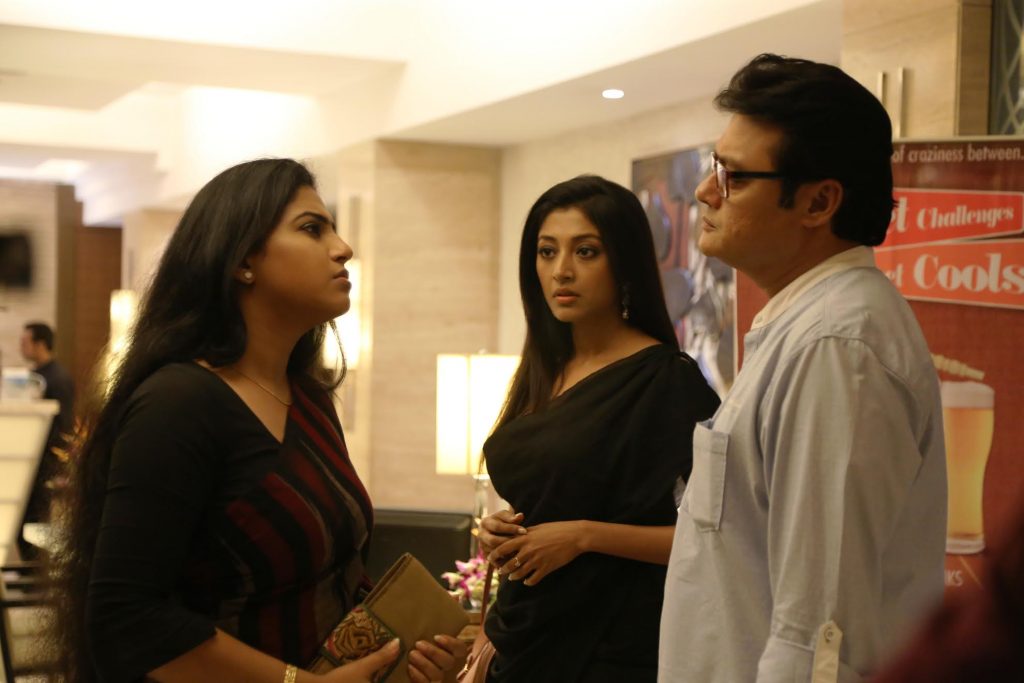Srabani (Paoli Dam) is an actress who finds herself featuring in a film being directed by Tirtharaj Roy (Saswata Chatterjee) who is married to Mouli (Koel Dhar). But Saswata is passing through a mental block and is struggling to get back to his creative mode. Does the entrance of Srabani change the equation of his relationship between himself and his creativity? Does Sraboni finds answers to the questions she is plagued by? Is Mouli threatened by the strange relationship that evolves between her director husband and the actress?
The recent trend in Indian cinema is to iconize and celebrate characters that either have no morals or are not bothered by values. Black Coffee is a rewind back to Mahesh Bhatt’s Arth (1982) where the husband working in the film industry leaves his wife soon after handing her keys to a new flat to live with his actress lover. His nephew Vikram Bhatt repeated this in Ankahee (2006) with Esha Deol portraying the mentally disturbed star, Aftab Shivadasani the director she falls in love with and Amisha Patel as the director’s wife.
But Black Coffee is a Bengali film shot in contemporary times so it has an overload of intellectual arrogance expressed through the character of the protagonist, several-times-National-Award-winning director who has producers lined up at his door waiting for him to say “yes.” His affair with the star he has created from zero breaks up his marriage but he suffers so much from guilt that he finds his life in a mess difficult to come out of. The darkest spot in the film is its grindingly slow pace heightened by the needless length of the film that runs into more than two hours of screening time.
The treatment, the technical features such as cinematography, with lovely scenic shots of Kalimpong and capturing the darkened interiors of Srabani’s apartment, editing, sound and so on are really good but that does not save the film from slowly and surely getting sucked into a morass called boredom and mediocrity. For example, we hardly ever find the director actually shooting a film but his office is choc-a-bloc with Black-and-White portraits of international greats in cinema along with a portrait of Satyajit Ray is prominent in his home. In the one scene, when he is trying out a new actress on the studio floors who is scared to death of her celebrated director, the film lifts itself up by a few notches. One wishes there were more such scenes to make the audience believe in the repeated emphasis on Tirtharaj Roy having won many National Awards. The same logic extends to Srabani, the star suffering from an anxiety disorder who is suicidal (Ankahee?). We hardly ever see her actually shooting for a film except in the beginning. Mouli, the wife, who turns out to be a talented painter is backgrounded with an artistic past very late in the film. The lyrics, the music and the songs are good mainly because they are all on the soundtrack but one wishes there were fewer songs.
It is the acting that saves this ship from sinking. Saswata is excellent as the arrogant, conceited, rude and ‘uncompromising’ filmmaker who finds he cannot even write a scene anymore. In the opening scenes, his acting is generously dotted with phases of silence and he does not talk much even in the rest of the film. He uses this silence ideally through his eyes, face, gait and body language. One ghastly touch though is Tirtharaj disguising himself with a terribly false white wig and a stick to buy his estranged wife’s paintings only to stock them in some hide-out of his! Why does he need to disguise himself at all? The flashbacks are superfluous and predictable.
Koel Dhar’s debut as his very young wife Mouli is layered with the naïve innocence of a wife in love who becomes confident only after he leaves her. Paoli’s mentally disturbed Srabani spills over with expressions yet, at times, her face is completely wooden. The tragically under-utilized talents of Badshaah Moitro as the director’s friend, chief assistant and conscience keeper come across through a finely nuanced performance. Saankar Chakraborty and Swagata Basu as Mouli’s close friends are very good too. Souptic as Mouli’s childhood friend, reminds us of the Raj Kiran character in Arth. Oh, and why is the film named Black Coffee? That is a riddle you will be able to solve only when you watch the film.
Kaagaz Ke Phool, anyone?
Bengali, Drama, Color


